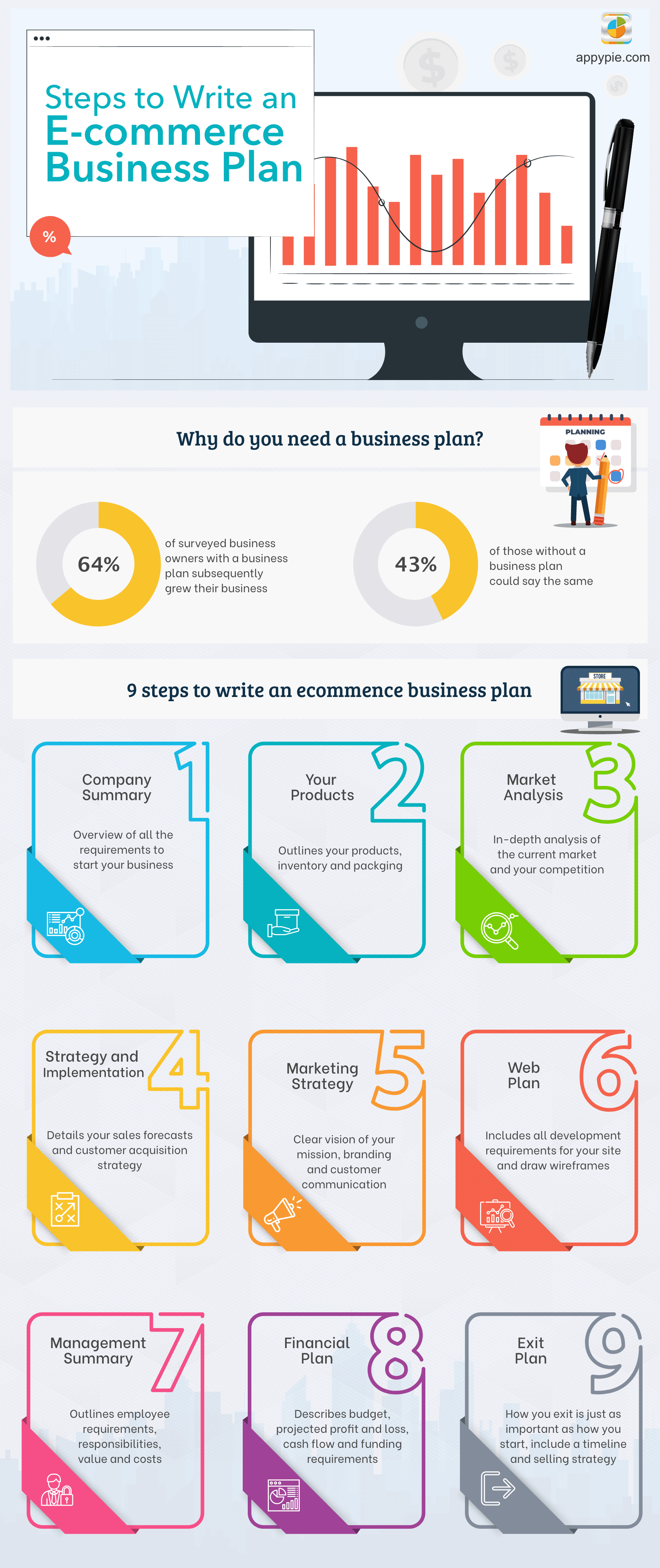How to Write an E-commerce Business Plan

A business plan is a basic step for every business. So many merchants and businessmen don’t even consider having a business plan when they are starting out. This can have major repercussions for a startup. For an E-commerce store, a business plan is even more important. There is a reason Amazon lacks serious competition. Most competitors that it inspired tried to begin without a proper business plan. In the past 5 years, many E-commerce stores have declined into obscurity and have shut down due to improper planning and poor investment of time and resources.
What is a business plan, you ask? As the name suggests, a business plan is a basic outline of how you will run your business. It includes a lot of information on the inner workings of your business. Creating a business plan is the second phase of starting a small business. While the blog below focuses on an E-commerce business plan, know that it can be applied to almost every business with certain tweaks. Read on to find out more.
Why Make An E-commerce Business Plan?
Before we begin talking about how to make an E-commerce business plan, let us discuss why every business, regardless of industry needs a business plan. There are 2 major reasons you need to create a plan for your business.Sets up a plan and direction
Everything in life, from groceries to multi-million dollar deals needs a set plan in motion. Even this blog you are reading right now was planned before being written. A business is no different. A good plan ensures that your company goes in the right direction when it begins. Going headfirst into entrepreneurial activities never ends well. A good business plan can help set an excellent direction for your business too. If your idea succeeds that very business plan will help you scale up your game. An unplanned business is hard to expand and scale. Another advantage of having a plan is knowing exactly if your business idea is viable and if your products bring value to customers.It helps convince potential investors
Many new entrepreneurs believe that investors will believe in their dream. Keep dreaming! Investors want results and they believe in numbers more than you ever will. And a plan is a numbered direction card they can understand. No amounts of Powerpoint presentations will ever convince them. The easiest way to get investors is to show a grounded, realistic, and working business plan. Trust me, they’ll salivate at the sight of it. Don’t try to fool them with a good looking plan either. They’ll question you relentlessly. Have a solid business plan and watch your idea’s worth rise astronomically.
How Long Should Your E-commerce Business Plan Be?
The length of your business plan depends on its purpose. If you’re writing it for potential investors, it needs to be as detailed as it can be. It also needs to look good so make sure you have a flurry of complementing colors in there. Hire a freelance designer for the same. If you’re making it for your self, make it easier to understand. Make it in a way you understand. Business plans can be anywhere from a 20 slide powerpoint presentation to an essay outlining everything.The 9 Essentials of an E-commerce Business Plan
Company summary
The company summary is one of the easiest steps involved in creating a company. The company summary involves the goal of the company you’re creating, how you’re going to full the requirements of your business and how you plan to start it. For an E-commerce business, the company goal and the requirements stay the same. All you need is an online marketplace website and a warehouse. How you plan to start it is also fairly similar. You can initially use postal services to ship your goods to your customers. Once you gain enough investment or profit you can begin hiring your men.Product outlines
Product outlines is where every E-commerce website differs from the other. The products you decide will target your outline. One of the major failures E-commerce sites make is targeting a multitude of products thinking they’re Amazon. Don’t be Amazon. Remember that Amazon started with a single product outline. They shipped books to your house before they even thought of shipping everything under the sun. Stick to a product line that’s easy to acquire, relatively cheap to manufacture, located near your warehouse to cut down on transportation costs. This also ensures that logistics and accounts are maintained properly. Don’t try to sell seashells if you’re a warehouse is in the MidWest.Market analysis
Before you finalize your products, analyze the market. Try not to compete against a brand with a monopoly. If you are competing with them, make sure that you market better than them or undercut their pricing. Market analysis will decide whether your idea is viable or not. Make sure that there are buyers who want to buy what you’re selling. No point in selling something that no one buys. Selling new VCRs in 2019 won’t go down well for you.Strategy and implementation
Business runs on strategy and its successful implementation. An insider tip. E-commerce has one of the easiest strategies to apply. The hardest part of E-commerce is the management which will be discussed shortly. The only strategical considerations are making accurate sales forecasts and how you will acquire customers.Market Strategy
There are two possible ways to market your new-found business: Paid marketing and organic marketing. I would suggest organic marketing for a newfound business. While paid marketing has almost sure-fire results, it makes you dependent and it gets expensive. Plus once you stop paid marketing, your business’ reach decreases significantly.Web Plan
Web plan is the fancy name I like to give for the backend layout and wireframes for your website. Make sure you hire developers that know how to create an optimized website. If your budget does not allow you to hire professional developers for your E-commerce website, you can use Appy Pie’s Website Builder. With Appy Pie’s Website Builder, you can create an E-commerce website without coding. Good Luck!Management Summary
This is a summary of how your management will function. The functioning of the company’s management splits responsibilities, clears out logistics and mentions the resources that needed to be invested for all the employees.Financial Plan
The financial plan for your company describes your budget split, initial investments, production costs, resource costs, projected profits & losses, actual profits & losses, funding requirements, and the sort. It is recommended that you hire accountants to help you devise a financial plan. This will be the trump card that you will present to your potential investors. I would advise more but financial planning is not exactly a strength.Exit Plan
While most businesses would deem this unnecessary, it’s honestly a big mistake to ignore your exit plan. You need to have alternatives to exit if your business runs into too many losses. There is no shame in admitting failure. Even the best business ideas can fail. A good exit plan will ensure that your employees, investors and you minimize debt & losses. Always have an exit plan.
 Recognition is every new brand’s most important asset. That can come only through organic marketing. There is a reason Amazon rarely pays for marketing. Organic marketing is better suited for E-commerce. Presence on the internet is directly proportional to your sales figures so making sure organic traffic is directed to your website you need strong pages to back your website.
Recognition is every new brand’s most important asset. That can come only through organic marketing. There is a reason Amazon rarely pays for marketing. Organic marketing is better suited for E-commerce. Presence on the internet is directly proportional to your sales figures so making sure organic traffic is directed to your website you need strong pages to back your website. Related Articles
- History of Christmas: Origins, Traditions & Facts- The Birth of Jesus Christ
- Natural Language Processing (NLP): Definition, Applications, and Benefits
- Canva Alternatives: Top 15 Graphic Design Tools to Replace Canva in 2024
- 15 Great PayPal Alternatives for Enhanced Payment Services
- How to Format Your Blog & Know About Blog Formats, Types & FAQs
- Understand The Key Elements of Art and Elevate Your Craft
- MMInA: Benchmarking Multihop Multimodal Internet Agents
- Push Notifications And How They Can Help Your App
- Easy Screenshot Tricks for iPhone, iPad & MacBook Users
- How to Get More Clients for Your Video Production Studio in 2024

